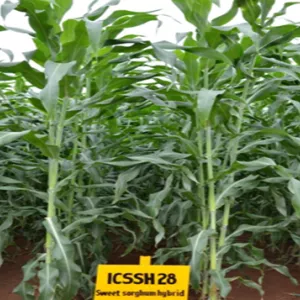Future market segment: Can sweet sorghum power the next generation of clean energy?
Sweet sorghum breeding trial at ICRISAT, India. (Photo by ICRISAT) by Swamikannu Nedumaran, Ephrem Habyarimana, Judy Thomas As fuel prices climb and climate goals intensify, the world needs fresh solutions. The latest contender is sweet sorghum, a resilient, high-sugar-content crop poised to power up the biofuel industry without draining food supplies. With its unique ability to grow on degraded soils,

Future market segment: Can sweet sorghum power the next generation of clean energy?
Sweet sorghum breeding trial at ICRISAT, India. (Photo by ICRISAT)
by Swamikannu Nedumaran, Ephrem Habyarimana, Judy Thomas
As fuel prices climb and climate goals intensify, the world needs fresh solutions. The latest contender is sweet sorghum, a resilient, high-sugar-content crop poised to power up the biofuel industry without draining food supplies. With its unique ability to grow on degraded soils, withstand drought conditions, and produce both bioethanol from stalk and grain and electricity from the crashed bagasse, sweet sorghum is capturing global attention as a cleaner, greener energy source.
Why sweet sorghum is a game changer
Traditional biofuels rely on food crops such as maize, sugarcane, and oilseeds, contributing to food price hikes and threatening food security. Sweet sorghum, with multiple uses for food, feed, fuel, and fodder, however, offers an alternative that grows fast, uses fewer resources, and reduces emissions. With optimal production each hectare has the potential to save more than 3,500 L of crude oil and to reduce CO2 emissions by 1.4 to 22 kg CO2 equivalents, making it a standout in energy and environmental impact.
Meeting soaring biofuel demand
Biofuel consumption is skyrocketing worldwide, with demand projected to hit 203 million metric tons in 2024. Ethanol and biodiesel consumption is expected to reach nearly 224 million metric tons by 2030. Leading markets like the United States, Brazil, and Europe are joined by fast-growing consumers such as India and China, creating a strong market pull for sustainable biofuel solutions. Sweet sorghum’s adaptability to various climates and marginal lands makes it an ideal candidate to meet this surge, ensuring energy needs are met without compromising food supplies.

A boon for small farmers
Beyond its positive environmental impact on reduction in water use and CO2 emissions, sweet sorghum provides new income streams for smallholder farmers in developing regions. Farmers can grow it in two seasons, generating revenue from both grain and stalk juice for biofuel production. Recognizing this opportunity, the International Crops Research Institute for the Semi-Arid Tropics (ICRISAT) and its partners have developed a target product profile (TPP) incorporating market-preferred traits such as high biomass yield, thick and lodging-tolerant stalks with juicy internodes, juice with high total soluble solids (Brix) content, a high percentage of extractable juice, and an extended harvest season. Future research should prioritize enhancing adaptability, yield, and quality (Brix and digestibility); prolonging the shelf life of sweet sorghum stalks and juice; minimizing the trade-off between higher Brix content and grain yield; investing in second-generation (2G) and sustainable aviation biofuels; and scaling up biofuel value chains.
The sweet sorghum cultivars could potentially cover the new market segment with an estimated area of 25 million ha in Asia, Africa, and South America, helping farmers tap into biofuel markets and improve their livelihoods.
The road ahead
As global climate action heats up, sweet sorghum is set to play a pivotal role in the green energy landscape. Continued research should enhance its yield, shelf life, and versatility, promising an even brighter future for this crop. With its potential to power economies and reduce emissions, sweet sorghum is no longer just a crop—it is a catalyst for a cleaner, more sustainable world.

